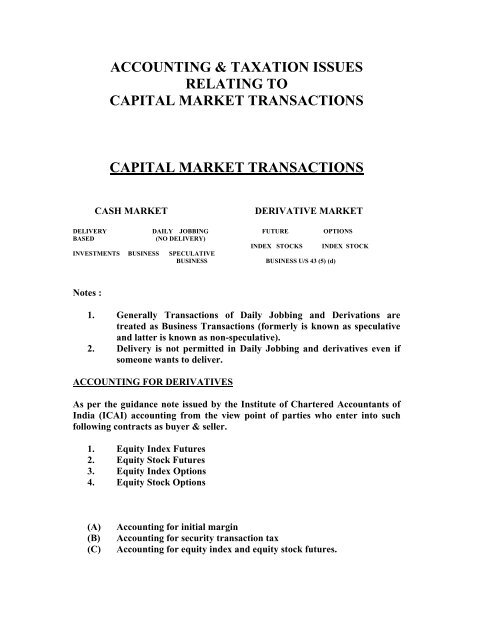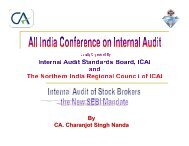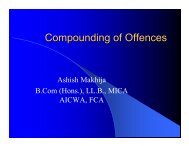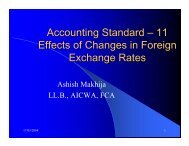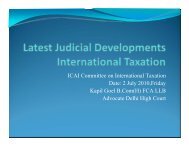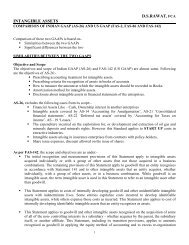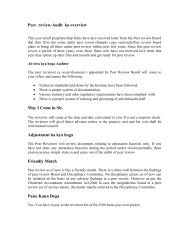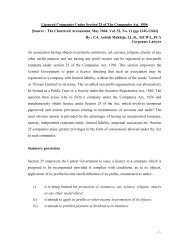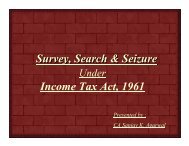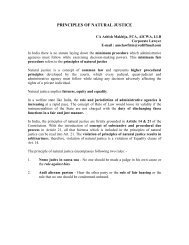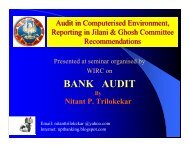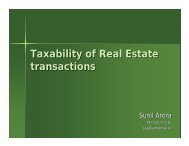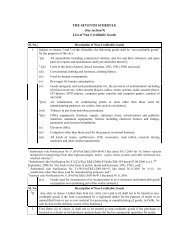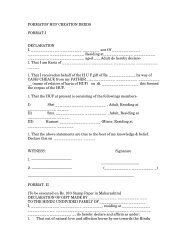Accounting & Taxation Issues relating to Capital Market Transactions
Accounting & Taxation Issues relating to Capital Market Transactions
Accounting & Taxation Issues relating to Capital Market Transactions
Create successful ePaper yourself
Turn your PDF publications into a flip-book with our unique Google optimized e-Paper software.
ACCOUNTING & TAXATION ISSUES<br />
RELATING TO<br />
CAPITAL MARKET TRANSACTIONS<br />
CAPITAL MARKET TRANSACTIONS<br />
CASH MARKET<br />
DERIVATIVE MARKET<br />
DELIVERY DAILY JOBBING FUTURE OPTIONS<br />
BASED<br />
(NO DELIVERY)<br />
INDEX STOCKS INDEX STOCK<br />
INVESTMENTS BUSINESS SPECULATIVE<br />
BUSINESS<br />
BUSINESS U/S 43 (5) (d)<br />
Notes :<br />
1. Generally <strong>Transactions</strong> of Daily Jobbing and Derivations are<br />
treated as Business <strong>Transactions</strong> (formerly is known as speculative<br />
and latter is known as non-speculative).<br />
2. Delivery is not permitted in Daily Jobbing and derivatives even if<br />
someone wants <strong>to</strong> deliver.<br />
ACCOUNTING FOR DERIVATIVES<br />
As per the guidance note issued by the Institute of Chartered Accountants of<br />
India (ICAI) accounting from the view point of parties who enter in<strong>to</strong> such<br />
following contracts as buyer & seller.<br />
1. Equity Index Futures<br />
2. Equity S<strong>to</strong>ck Futures<br />
3. Equity Index Options<br />
4. Equity S<strong>to</strong>ck Options<br />
(A)<br />
(B)<br />
(C)<br />
<strong>Accounting</strong> for initial margin<br />
<strong>Accounting</strong> for security transaction tax<br />
<strong>Accounting</strong> for equity index and equity s<strong>to</strong>ck futures.
o <strong>Accounting</strong> for payment/receipt of mark-<strong>to</strong>-market margin.<br />
o <strong>Accounting</strong> for open interests in futures contracts as on the<br />
balance sheet date.<br />
o <strong>Accounting</strong> at the time of final settlement or squaring – up.<br />
o <strong>Accounting</strong> in case of default.<br />
(D)<br />
<strong>Accounting</strong> for equity index options and equity s<strong>to</strong>ck options<br />
‣ <strong>Accounting</strong> for payment/receipt of the premium.<br />
‣ <strong>Accounting</strong> for open interests in options contracts as on the<br />
balance sheet date.<br />
‣ <strong>Accounting</strong> at the time of squaring – up of an option<br />
contracts.<br />
‣ Method for determination of profit/loss in multiple options<br />
situation.<br />
‣ <strong>Accounting</strong> at the time of final settlement :<br />
1.1 Index options and cash – settled s<strong>to</strong>ck options contracts :<br />
1.1.1 In the books of buyer/holder<br />
1.1.2 In the books of seller/writer<br />
1.2 Delivery settled s<strong>to</strong>ck options contracts<br />
1.2.1 In the case of buyer/holder<br />
1.2.2 In case of seller /writer<br />
(E)<br />
DISCLOSURE
ACCOUNTING FOR CASH MARKET<br />
TRANSACTIONS<br />
1. <strong>Accounting</strong> for daily jobbing transactions.<br />
2. <strong>Accounting</strong> for delivery based transactions as business<br />
3. <strong>Accounting</strong> for delivery based transactions as investment.<br />
1. <strong>Accounting</strong> for daily jobbing transactions.<br />
• Speculation business account should be debited or credited.<br />
• Entries should be made on the bill date.<br />
• STT paid should be debited & treated as expenditure.<br />
2. <strong>Accounting</strong> for delivery based transactions as<br />
business.<br />
‣ Separate purchases account and sales account should be<br />
opened.<br />
‣ Entries should be made on the bill date.<br />
‣ STT paid should be debited <strong>to</strong> separate STT account &<br />
treated as expenditure under P&L A/c. Earlier it was not<br />
allowed as business expenditure u/s 40(a) (ib) which stands<br />
deleted w.e.f. Assessment Year 2009-10.<br />
‣ AS 2 is not applicable in accounting for inven<strong>to</strong>ries for<br />
shares, debentures and other financial instruments held as<br />
s<strong>to</strong>ck in trade.<br />
‣ The accounting policies adopted in measuring inven<strong>to</strong>ries,<br />
including the cost formula used should be disclosed in<br />
financial statements.<br />
‣ As per AS9, dividends from investments in shares are not<br />
recognized in the statement of profit and loss until a right <strong>to</strong><br />
receive payment is established.
3. <strong>Accounting</strong> for delivery based transactions as<br />
investment.<br />
‣ Purchase and sale entries should be made through investment<br />
account.<br />
‣ Entries should be made on the bill date.<br />
‣ STT paid should be debited <strong>to</strong> separate STT account and<br />
treated as drawings from the capital. STT will neither be the<br />
part of Cost of Acquisition nor it will be deducted from sale<br />
value.<br />
‣ As per AS 13, cost of an investment includes acquisition<br />
charges such as brokerage, fees and duties.<br />
‣ <strong>Accounting</strong> for Right & Bonus issues.<br />
TAXATION OF DERIVATIVES<br />
(A)<br />
(B)<br />
(C)<br />
(D)<br />
(E)<br />
Derivative <strong>Transactions</strong> <strong>to</strong> be taxed as Business Income as<br />
per Sec. 43 (5) (d).<br />
Turnover for the purpose of tax audit u/s 44AB as per Para<br />
5.11 of Guidance not on tax audit by ICAI.<br />
All usual business expenditure are deductible.<br />
Interest on Borrowed money.<br />
Security transaction tax – Rebate u/s 88E, rates of STT and<br />
allowable as expenditure.<br />
(F) Carry forward & set off of loses u/s 70, 71, 72.<br />
(G)<br />
Set off with commodity transactions.
(A). Derivative <strong>Transactions</strong> <strong>to</strong> be taxed as Business<br />
Income<br />
SECTION 43 (5)<br />
Speculative transaction means a transaction in which a contract for the<br />
purchase or sale of any commodity, including s<strong>to</strong>cks and shares, is<br />
periodically or ultimately settled otherwise than by the actual delivery or<br />
transfer of the commodity or scrip’s:<br />
Provided that for the purposes of this clause<br />
(a) a contract in respect of raw materials or merchandise entered in<strong>to</strong> by a<br />
person in the course of his manufacturing or merchanting business <strong>to</strong><br />
guard against loss through future price fluctuations in respect of his<br />
contracts for actual delivery of goods manufactured by him or<br />
merchandise sold by him; or<br />
(b) a contract in respect of s<strong>to</strong>cks and shares entered in<strong>to</strong> by a dealer or<br />
inves<strong>to</strong>r therein <strong>to</strong> guard against loss in his holdings of s<strong>to</strong>cks and shares<br />
through price fluctuations; or<br />
(c) a contract entered in<strong>to</strong> by a member of a forward market or a s<strong>to</strong>ck<br />
exchange in the course of any transaction in the nature of jobbing or<br />
arbitrage <strong>to</strong> guard against loss which may arise in the ordinary course of<br />
his business as such member; (or)<br />
[(d) an eligible transaction in respect of trading in derivatives referred <strong>to</strong> in<br />
clause (ac) of section 2 of the Securities Contracts (Regulation) Act, 1956 (42 of<br />
1956) carried out in a recognized s<strong>to</strong>ck exchange;]<br />
Shall not be deemed <strong>to</strong> be a speculative transaction;<br />
[Explanation. For the purposes of this clause, the expressions<br />
(i) eligible transaction means any transaction,<br />
(A) carried out electronically on screen-based systems through a s<strong>to</strong>ck<br />
broker or sub-broker or such other intermediary registered under<br />
section 12 of the Securities and Exchange Board of India Act, 1992<br />
(15 of 1992) in accordance with the provisions of the Securities<br />
Contracts (Regulation) Act, 1956 (42 of 1956) or the Securities and<br />
Exchange Board of India Act, 1992 (15 of 1992) or the Deposi<strong>to</strong>ries<br />
Act, 1996 (22 of 1996 and the rules, regulations or bye-laws made or<br />
directions issued under those acts or by banks or mutual funds on a<br />
recognized s<strong>to</strong>ck exchange; and<br />
(B) which is supported by a time stamped contract note issued by such<br />
s<strong>to</strong>ck broker or sub-broker or such other intermediary <strong>to</strong> every client
indicating in the contract note the unique client identity number<br />
allotted under any Act referred <strong>to</strong> in sub- clause (A) and permanent<br />
account number allotted under this Act;<br />
(ii) recognized s<strong>to</strong>ck exchange means a recognized s<strong>to</strong>ck exchange as<br />
referred <strong>to</strong> in clause (f) of section 2 of the Securities Contracts<br />
(Regulation) Act, 1956 (42 of 1956) and which fulfils such conditions as<br />
may be prescribed and notified by the Central Government for this<br />
purpose;]<br />
(B) Turnover for the purpose of Tax audit u/s 44AB as<br />
per Para 5.11 of guidance note on tax audit by ICAI.<br />
‣ The <strong>to</strong>tal of favorable and unfavorable differences shall be taken as<br />
turnover.<br />
‣ Premium received on sale of options is also <strong>to</strong> be included in turnover.<br />
‣ In respect of any reverse trades entered, the differences thereon, should also<br />
form part of the turnover.<br />
(C ) All usual business expenditure are deductible.<br />
(D ) Interest on borrowed money is deductible.<br />
(E) (i ) Security Transaction Tax – Rebate U/s 88E<br />
(Rebate of STT U/s 88 E discontinued w.e.f. Assessment Year 2009-10)<br />
‣ Deduction from the amount of income-tax on such income arising<br />
from such derivative transactions of any amount equal <strong>to</strong> the<br />
securities transaction tax paid by him in respect of the taxable<br />
securities transactions entered in<strong>to</strong> in the course of his business<br />
during that previous year.<br />
‣ No deduction under this section shall be allowed unless the assessee<br />
furnishes along with the return of income; evidence of payment of<br />
securities transaction tax in the prescribed form (sec.) Tax Rule 20<br />
AB and Form No. 10 DB and 10 DC).<br />
‣ The amount of deduction under this section shall not exceed the<br />
amount of income-tax on such income.
(ii)<br />
Rates of STT<br />
‣ STT will be levied on Sale of a derivative (payable by seller)<br />
where the transaction of such sale is entered in<strong>to</strong> in a recognized<br />
s<strong>to</strong>ck exchange at the following rate :<br />
1-10-2004 <strong>to</strong> 31-5-2005 0.01%<br />
1-06-2005 <strong>to</strong> 31-5-2006 0.0133%<br />
1-0602006 <strong>to</strong> 31-5-2008 0.017%<br />
w.e.f. 1.6.2008 rates of STT are as under :<br />
(a) Sale of an option in securities 0.017% payable by seller<br />
(b) Sale of an option in securities 0.125% payable by purchaser<br />
Where option is exercised<br />
(c ) Sale of a future in securities 0.017% payable by seller<br />
(iii)<br />
STT paid is an allowable expenditure from Asstt. Year 2009-10 due <strong>to</strong><br />
deletion of Sec. 40(a) (ib) w.e.f. 1.4.2009.<br />
(F) CARRY FORWARD & SET OFF OF LOSSES U/s<br />
70, 71, 72.<br />
Section 70<br />
Set off of loss from one source against income from<br />
another source under the same head of income<br />
70. (1) Where the net result for any assessment year in respect of any source falling<br />
under any head of income, other than <strong>Capital</strong> gains, is a loss. Such loss can be set<br />
off against his income from any other source under the same head.<br />
(2) Where the result of the computation made for any assessment year under<br />
sections 48 <strong>to</strong> 55 in respect of any short-term capital asset is a loss, the assessee<br />
shall be entitled <strong>to</strong> have the amount of such loss set off against the income, if any,<br />
as arrived at under a similar computation made for the assessment year in respect of<br />
any other capital asset.<br />
(3) Where the result of the computation made for any assessment year under<br />
sections 48 <strong>to</strong> 55 in respect of any capital asset (other than a short term capital<br />
asset) is a loss, the assessee shall be entitled <strong>to</strong> have the amount of such loss set off<br />
against the income, if any, as arrived at under a similar computation made for the
assessment year in respect of any other capital asset not being a short-term capital<br />
asset.]<br />
SECTION 71<br />
Set off of loss from one head against income from another.<br />
‣ Where in respect of any assessment year the net result of the<br />
computation under any head of income, other than <strong>Capital</strong> gains, is a<br />
loss and the assessee has no income under the head <strong>Capital</strong> gains, he<br />
shall be entitled <strong>to</strong> have the amount of such loss set off against his<br />
income, if any, assessable for that assessment year under any other<br />
head.<br />
‣ If the net result of the computation under the head Profits and gains<br />
of business or profession is a loss and the assessee has income<br />
assessable under the head Salaries, the assessee shall not be entitled<br />
<strong>to</strong> have such loss set off against such income.<br />
‣ Where in respect of any assessment year the net result of the<br />
computation under any head of income, other than capital gains, is a<br />
loss and the assessee has income assessable under the head capital<br />
against such loss may be set off against the income under any head<br />
of income including the head capital gains (whether <strong>relating</strong> <strong>to</strong> short<br />
term capital assets or any other capital assets).<br />
‣ Where in respect of any assessment year the net result of the<br />
computation under the head capital gains is a loss and the assessee<br />
has income assessable under any other head of income the assessee<br />
shall not be entitled <strong>to</strong> have such loss set off against income under<br />
the other head.<br />
SECTION 72<br />
Carry forward and set off of business losses.<br />
72. [(1) Where for any assessment year, the net result of the computation under the<br />
head Profits and gains of business or profession is a loss <strong>to</strong> the assessee, not being a<br />
loss sustained in a speculation business, and such loss cannot be or is not wholly set<br />
off against income under any head of income in accordance with the provisions of<br />
section 71, so much of the loss as has not been so set off or, where he has no<br />
income under any other head, the whole loss shall, subject <strong>to</strong> the other provisions<br />
of this Chapter, be carried forward <strong>to</strong> the following assessment year , and
(i)<br />
(ii)<br />
it shall be set off against the profits and gains, if any, of any business<br />
or profession carried on by him and assessable for that assessment<br />
year;<br />
if the loss cannot be wholly so set off, the amount of loss not so set off<br />
shall be carried forward <strong>to</strong> the following assessment year and so on:]<br />
(2) Where any allowance or part thereof is u/s 32 (2) or 35 (4) <strong>to</strong> be<br />
carried forward effect shall first be given <strong>to</strong> the provisions of this<br />
section.<br />
(3) No loss shall be carried forward under this section for more than eight<br />
assessment years immediately succeeding the assessment year for<br />
which the loss was first computed.<br />
(G)<br />
SET OFF WITH COMMODITY TRANSACTIONS<br />
‣ Delivery based commodity transactions are business income.<br />
‣ Other commodity transactions settled otherwise than delivery are<br />
speculative in nature.<br />
‣ Profit in capital market derivative transactions can not be set off against loss<br />
in commodity transactions settled otherwise in delivery.<br />
‣ Profit in capital market transactions can be set off with the loss of delivery<br />
based commodity transactions and vice versa.<br />
‣ Profit in commodity transactions settled otherwise in delivery can be set off<br />
with the loss of capital market derivative transactions.<br />
TAXATION OF CASH MARKET TRANSACTIONS<br />
(Daily jobbing)<br />
(A) Cash market (daily jobbing) transactions are speculative in<br />
nature as per section 43 (5). (<strong>Transactions</strong> has <strong>to</strong> be settled by<br />
difference, delivery is not permitted even if someone wishes <strong>to</strong><br />
deliver).<br />
(B) Turnover for the purpose of tax audit U/s 44AB as per Para 5.11<br />
of guidance note on tax audit by ICAI.<br />
(C) All usual business expenditure are deductible.<br />
(D)<br />
(E)<br />
Interest on borrowed money is deductible.<br />
Security transaction tax – Rebate U/s 88E, rates of STT and<br />
allowable as expenditure.
(F)<br />
(G)<br />
Carry forward & set off of losses U/s 70, 71, 72 and losses in<br />
speculation business U/s 73 including deeming provisions.<br />
Set off with commodity transactions.<br />
(A) Cash market (Daily Jobbing) transactions are<br />
speculative in nature as per section 43 (5).<br />
Speculative <strong>Transactions</strong><br />
‣ There is a contract for the purchase or sale.<br />
‣ Purchase or sale is of any commodity (including s<strong>to</strong>cks and shares).<br />
‣ The contract is periodically or ultimately settled.<br />
‣ The settlement is otherwise than by the actual delivery or transfer of<br />
such commodity or scrip’s.<br />
‣ Delivery is not permitted even if someone wishes <strong>to</strong> deliver.<br />
(B) TURNOVER FOR THE PURPOSE OF TAX AUDIT<br />
U/S 44AB AS PER PARA 5.11 OF GUIDANCE<br />
NOTE ON TAX AUDIT BY ICAI.<br />
‣ In speculative transactions the difference amount is “turnover”.<br />
‣ There can be both positive and negative differences.<br />
‣ The aggregate of both positive and negative differences is <strong>to</strong> be considered<br />
as the turnover for the purpose of section 44 AB.<br />
(C ) ALL USUAL BUSINESS EXPENDITURE ARE<br />
DEDUCTIBLE.<br />
(D) INTEREST ON BORROWED MONEY IS<br />
DEDUCTIBLE<br />
(E) (i)Security transaction tax – Rebate U/s 88 E. (Rebate of<br />
2009-10). STT U/s 88E discontinued w.e.f.<br />
1.4.2009(Assessment Year
‣ If there is a loss in daily jobbing transactions whether STT on that can<br />
be used in other security business transactions? STT paid on<br />
speculative <strong>Transactions</strong> can not be utilized for non-speculative<br />
transactions.<br />
‣ If there is profit in all security transactions treated as business income<br />
(like derivative transactions, daily jobbing transactions and delivery<br />
based business transactions), whether STT paid on them should be<br />
used collectively or separately. STT paid on speculative and nonspeculative<br />
transactions is <strong>to</strong> be considered separately.<br />
(ii)<br />
Rates of STT<br />
STT will be levied on sale of an equity share (payable by seller)in a<br />
company or a unit of an equity oriented fund, where the transaction of<br />
such sale is entered in<strong>to</strong> in a recognized s<strong>to</strong>ck exchange and settled<br />
otherwise than actual delivery. The rates are :<br />
1-10-2004 <strong>to</strong> 31-5-2005 0.015%<br />
1-06-2005 <strong>to</strong> 31-5-2006 0.02%<br />
From 1-06-2006 0.025%<br />
(iii) STT paid is an allowable expenditure from Asstt. Year 2009-10 due<br />
<strong>to</strong> deletion of sec. 40 (a) (ib) w.e.f. 1.4.2009.<br />
(F) (i) CARRY FORWARD & SET OFF OF LOSSES U/S 70, 71,72- for full<br />
details please see taxation of derivatives.<br />
‣ Sec. 70 – Set off of loss from one source against income from<br />
another source under the same head of income.<br />
‣ Sec. 71 – Set off of loss from one head against income from another.<br />
‣ Sec. 72 – Carry forward and set off of business losses.<br />
(ii) Sec. 73 – Losses in speculation business – including deeming<br />
Provisions.<br />
Loss in speculation business shall not be set off except against profit and<br />
gains, if any, of another speculation business.<br />
In respect of allowance on account of depreciation or capital expenditure on<br />
scientific research, the provisions of sub-section (2) of section 72 shall apply<br />
in relation <strong>to</strong> speculation business as they apply in relation <strong>to</strong> any other<br />
business.
No loss shall be carried forward under this section for more than four<br />
assessment years immediately succeeding the assessment year for which the<br />
loss was first computed.<br />
Explanation <strong>to</strong> Section 73<br />
‣ It applies <strong>to</strong> a company assessee only.<br />
‣ Where any part of the business of a company (other than a company whose<br />
gross <strong>to</strong>tal income consists mainly of income which is chargeable under the<br />
heads Interest on securities, Income from house property, <strong>Capital</strong> gains and<br />
Income from other sources, or a company the principal business of which is<br />
the business of banking or the granting of loans and advances) consists in<br />
the purchase and sale of shares of other companies, such company shall, for<br />
the purposes of this section, be deemed <strong>to</strong> be carrying on a speculation<br />
business <strong>to</strong> the extent <strong>to</strong> which the business consists of the purchase and sale<br />
of such shares. In other words it shall not apply <strong>to</strong> the following companies :<br />
(a) Investment company i.e. the company whose <strong>to</strong>tal income mainly consists<br />
of income from house property, capital gain and income from other sources.<br />
(b) Company whose principal business is of banking or of granting loans and<br />
advances.<br />
‣ Buying or selling of units of UTI by assessee-company cannot be treated as<br />
speculation business under the Explanation <strong>to</strong> section 73 for the purpose of<br />
allowing set off of loss suffered in such a business [Apollo Tyres Ltd.<br />
V.CIT{2002} 255 ITR 273 (SC)]. - Units of Mutual Fund are not covered<br />
including that of UTI.<br />
‣ Derivative transactions are not covered.<br />
‣ Penalty for non-performance of a contract is not covered.<br />
‣ Purchase and sale of shares against delivery is also covered.<br />
‣ Explanation is not applicable <strong>to</strong> capital asset i.e. held as investment.
(G)<br />
SET OFF WITH COMMODITY TRANSACTIONS<br />
‣ Delivery based commodity transactions are business income.<br />
‣ Other commodity transactions<br />
speculative in nature.<br />
otherwise than delivery are<br />
‣ Profit in capital market daily jobbing transactions can be set off<br />
against loss in commodity transactions settled otherwise in delivery<br />
and vice versa.<br />
‣ Loss in capital market daily jobbing transactions can not be set off<br />
with the profit of delivery based commodity transactions/derivative<br />
transactions.<br />
‣ Profit in capital market daily jobbing transactions can be set off with<br />
the loss of delivery based commodity transactions/derivative<br />
transactions.<br />
TAXATION OF CASH MARKET TRANSACTIONS<br />
(DELIVERY BASED AS BUSINESS)<br />
(A)<br />
Cash <strong>Market</strong>(Delivery based as Business) (Delivery based)<br />
transactions can be treated as Business Income or as investment.<br />
(B) Turnover for the purpose of tax audit U/s 44AB as per Para 5.11<br />
of guidance note on tax audit by ICAI.<br />
(C)<br />
(D)<br />
(E)<br />
All usual business expenditure are deductible.<br />
Interest on borrowed money is deductible.<br />
Security transaction tax – Rebate U/s 88E, Rates of STT and<br />
allowable as expenditure.<br />
(F) Carry forward & set off of losses U/s 70, 71, 72.<br />
(G)<br />
Set off with commodity transactions.
(H)<br />
Valuation of inven<strong>to</strong>ries.<br />
(I) Dividend income is exempt U/s 10(34).<br />
(J)<br />
Disallowance of expenditure including of interest U/s 14A in<br />
relation <strong>to</strong> exempt income.<br />
A. Cash <strong>Market</strong> (Delivery based) transactions can be treated as<br />
business income or as investment.<br />
‣ CBDT circular no. 4/2007 dated 15 June, 2007.<br />
Treatment of a particular transaction as investment or<br />
s<strong>to</strong>ck in trade during the particular financial year.<br />
<strong>Accounting</strong> & intention.<br />
Frequency & volume of <strong>Transactions</strong>.<br />
Circular does not lay down any clear cut guidelines.<br />
Mixed questions of law and fact.<br />
[CIT Bombay vs. H. Holck Larsen (160 ITR 67) SC] also see Associated Industrial<br />
Development Company case 8217 R 586 (SC) and 288 ITR 641 (AAR).<br />
Generate a lot of litigation.<br />
(B) TURNOVER FOR THE PURPOSE OF TAX AUDIT U/S<br />
44AB AS PER PARA 5.11 OF GUIDANCE NOTE ON TAX<br />
AUDIT BY ICAI.<br />
‣ Where the transaction for the purchase or sale of any commodity<br />
including s<strong>to</strong>cks and shares is delivery based whether intended or<br />
by default, the <strong>to</strong>tal value of the sales is <strong>to</strong> be considered as<br />
turnover.<br />
‣ Sale of investment will not be included in the turnover.<br />
‣ Dividend will be the part of turnover.
(C ) ALL USUAL BUSINESS EXPENDITURE ARE<br />
DEDUCTIBLE.<br />
(D) INTEREST ON BORROWED MONEY IS<br />
DEDUCTIBLE.<br />
(E) (i) SECURITY TRANSACTION TAX – REBATE U/S 88 E<br />
Rebate of STT U/s 88 E discontinued w.e.f. 1.4.2009 (Assessment<br />
Year 2009-10)<br />
(ii) Rates of STT :<br />
‣ STT has <strong>to</strong> be paid by buyer as well as seller in the delivery<br />
based trade.<br />
‣ STT will be levied on sale or purchase of an equity share<br />
(payable by seller or buyer) in a company or a unit of an equity<br />
oriented fund, where the transaction of such sale or purchase is<br />
entered in<strong>to</strong> in a recognized s<strong>to</strong>ck exchange and settled by actual<br />
delivery or transfer. The rates are :<br />
1.10.2004 <strong>to</strong> 31.5.2005 0.075%<br />
1.06.2005 <strong>to</strong> 31.5.2006 0.1%<br />
From 1.06.2006 0.125%<br />
STT is <strong>to</strong> be paid at above rates in case of<br />
a) Purchases by the purchaser and<br />
b) Sales by the seller.<br />
(iii) STT paid is an allowable expenditure from Asstt. Year 2009-10<br />
due <strong>to</strong> deletion of sec. 40 (a) (ib) w.e.f. 1.4.2009.<br />
(F)<br />
CARRY FORWARD & SET OFF OF LOSSES U/S 70,71,72 – for<br />
full details please see taxation of derivatives.<br />
(G)<br />
Set off with commodity transactions.<br />
As discussed in taxation of derivatives.
(H)<br />
Valuation of inven<strong>to</strong>ries<br />
‣ AS 2 is not applicable.<br />
‣ One can use LIFO, FIFO, Average value or any other method of<br />
valuation.<br />
‣ Closing s<strong>to</strong>ck can be valued at cost or cost or market price,<br />
whichever is less.<br />
‣ Same method have <strong>to</strong> be followed for subsequent years.<br />
(I) DIVIDEND INCOME IS EXEMPT U/S 10(34)<br />
o Dividend income is exempt U/s 10(34) ( If dividend distribution tax<br />
U/s 115(0) has been paid by the paying company).<br />
o Normal Dividend – Normal dividend passed in AGM is deemed <strong>to</strong><br />
be the income of the previous year in which AGM held.<br />
o Deemed Dividend – Notional dividend U/s 2(22) is treated as the<br />
income of previous year in which it is so distributed or paid.<br />
o Interim Dividend – Interim dividend is deemed <strong>to</strong> be the income of<br />
the previous year in which the amount of such dividend is<br />
unconditionally made available by the company <strong>to</strong> a shareholder.<br />
Interim dividend is assessable when the dividend warrant is issued<br />
by the company.<br />
o Dividend income is assessable under income from other sources Sec.<br />
56(2)(i).<br />
‣ DIVIDEND STRIPPING SEC. 94(7)<br />
Where (a) any person buys or acquires any securities or<br />
unit within a period of three months prior <strong>to</strong> the record<br />
date;<br />
[(b) such person sells or transfers<br />
(i) such securities within a period of three months after<br />
such date; or<br />
(ii) Such unit within a period of nine months after such<br />
date;]
(c ) the dividend or income on such securities or unit received<br />
or receivable by such person is exempt, then the loss, if any,<br />
arising <strong>to</strong> him on account of such purchase and sale of<br />
securities or unit, <strong>to</strong> the extent such loss does not exceed the<br />
amount of dividend or income received or receivable on such<br />
securities or unit, shall be ignored for the purposes of<br />
computing his income chargeable <strong>to</strong> tax.<br />
‣ Bonus stripping Sec. 94 (8)<br />
Where (a) any person buys or acquires any units within a period<br />
of three months prior <strong>to</strong> the record date;<br />
(b) such person is allotted additional units without any<br />
payment on the basis of holding of such units on such<br />
date;<br />
(c ) Such person sells or transfers all or any of the units<br />
referred <strong>to</strong> in clause (a) within a period of nine months after such<br />
date, while continuing <strong>to</strong> hold all or any of the additional units<br />
referred <strong>to</strong> in clause (b), then, the loss, if any, arising <strong>to</strong> him on<br />
account of such purchase and sale of all or any of such units shall<br />
be ignored for the purposes of computing his income chargeable <strong>to</strong><br />
tax and notwithstanding anything contained in any other provisions<br />
of this Act, the amount of loss so ignored shall be deemed <strong>to</strong> be the<br />
cost of purchase or acquisition of such additional units referred <strong>to</strong><br />
in clause (b) as are held by him on the date of such sale or transfer.<br />
(J)<br />
Disallowance of expenditure including interest U/s 14A R/W Rule<br />
8D in relation <strong>to</strong> exempt income.<br />
Method of calculation of disallowance prescribed by the CBDT vide<br />
notification no. S.O. 547 (E) dated 24.3.2008 (2991TR (ST) 88).
TAXATION OF CASH MARKET TRANSACTIONS<br />
(DELIVERY BASED AS INVESTMENT)<br />
(A) Profit or gains on transfer of a capital asset u/s<br />
45(1).<br />
(B) Profit or gains on conversion of capital asset in<strong>to</strong><br />
s<strong>to</strong>ck in trade u/s 45(2).<br />
(C) Profit or gains on transfer made by the<br />
deposi<strong>to</strong>ry U/s 45 (2A).<br />
(D) Short/long term capital asset U/s 2(42A)/2 (29A).<br />
(E) Exemption <strong>to</strong> long term capital gain U/s 10(38).<br />
(F) Tax on short term capital gain U/s 111A.<br />
(G) Right and bonus shares.<br />
(H) Interest on borrowed money.<br />
(I) Security transaction tax – No rebate u/s 88E.<br />
(J) Carry forward & set off of losses u/s 70,71,74.<br />
(K) Dividend income is exempt u/s 10(34).<br />
(L) <strong>Transactions</strong> not regarded as transfer u/s 47.<br />
(M) Special provision with respect <strong>to</strong> capital gains in<br />
the case of a NON RESIDENT U/S 48 RULE<br />
115A.<br />
(N) Cost with reference <strong>to</strong> certain modes of<br />
acquisition.<br />
(O) “Adjusted”, “cost of improvement” and “cost of<br />
Acquisition” for the purpose of sections 48 & 49<br />
u/s 55.<br />
(P) Off <strong>Market</strong> <strong>Transactions</strong>.<br />
(Q) Section 115 AC, 115 ACA and 115AD.
(A) PROFIT OR GAINS ON TRANSFER OF A CAPITAL<br />
ASSET SEC. 45(1).<br />
‣ Profit or gains should arise from the transfer of an asset.<br />
‣ Such asset should be a capital asset.<br />
‣ Transfer should be effected in the previous year.<br />
Date of transaction is not the date of transfer.<br />
‣ Liability <strong>to</strong> capital gain arises only when the assessee acquire<br />
the right <strong>to</strong> receive the profits or gains arising from such<br />
transfer.<br />
(B) PROFIT OR GAINS ON CONVERSION OF CAPITAL ASSET INTO<br />
STOCK IN TRADE U/S 45(2).<br />
‣ Taxable in previous year in which such s<strong>to</strong>ck in trade is sold or<br />
transferred and not in the year in which the conversion takes<br />
place.<br />
‣ Full value of consideration for this purpose is the fair market<br />
value of the asset on the date of such conversion.<br />
‣ For the purpose of indexation, the year of conversion is taken<br />
<strong>to</strong> be the year of transfer of the capital asset.<br />
‣ The period of holding the asset runs from the date of<br />
acquisition of the asset <strong>to</strong> the date of such conversion.<br />
Note : Whether capital gain arises or not on conversion of s<strong>to</strong>ck in trade<br />
in<strong>to</strong> a capital asset is a disputable point.<br />
However, in Asstt. CIT Bright Star Investment (P) Ltd. (2008) 24 SOT 288<br />
(MVm). It was held that “in absence of specific provision in sec. 45(2) <strong>to</strong><br />
deal with a situation where shares were converted from s<strong>to</strong>ck-in-trade in<strong>to</strong><br />
investment and later on investment was sold at profit, profit earned on sale<br />
was assessable as LTCG, it was not proper <strong>to</strong> compute business income till<br />
date of conversion of shares in<strong>to</strong> investment and then <strong>to</strong> compute long term<br />
capital gain till date of sale of investment (Asstt. Year 2000-01).
(c )PROFIT OR GAINS ON TRANSFER MADE BY THE<br />
DEPOSITOR U/S 45(2A).<br />
‣ The deposi<strong>to</strong>ry is not assessed <strong>to</strong> capital gain although it is deemed<br />
<strong>to</strong> be the registered owner of securities by virtue of section 10(1 ) of<br />
the Deposi<strong>to</strong>ries Act, 1996.<br />
‣ Under demat determination of the period of holding of securities and<br />
their cost of acquisition is made on the basis of FIFO method<br />
(circular no. 768 dated 24 th June, 1998).<br />
(D) SHORT/LONG TERM CAPITAL ASSET KU/S 2 (42A)/2(29a).<br />
‣ For this purpose an asset being shares of a company or units of a<br />
mutual fund or any other security listed in a recognized s<strong>to</strong>ck<br />
exchange or a zero coupon bond held for not more than 12 months is<br />
treated as short term capital asset otherwise it is treated as long term<br />
capital asset.<br />
‣ For example: shares purchased on 27.3.2008 and sold on 27.3.2009<br />
are <strong>to</strong> be treated as short term capital asset. If above shares are sold<br />
on 28.3.2009 then they are <strong>to</strong> be treated as long term capital asset.<br />
Date of sale is not <strong>to</strong> be included while calculating period of holding.<br />
(E) EXEMPTION TO LONG TERM CAPITAL GAIN U/S 10(38).<br />
‣ Exemption for equity shares in a company or units of a equity oriented<br />
fund.<br />
‣ Sale transaction should take place in a recognized s<strong>to</strong>ck exchange.<br />
‣ STT should be paid at the time of sale.<br />
‣ If STT not paid, normal tax rates regime shall apply.<br />
‣ Exemption is available from assessment year 2005-06. In case of<br />
company LTCG is <strong>to</strong> be considered as part of Book Project for MAT<br />
purposes w.e.f. Assessment year 2007-08 – Sec proviso <strong>to</strong> Sec.10(38).
‣ Exemption is available <strong>to</strong> resident as well as non-resident.<br />
‣ Acquisition may be through recognized s<strong>to</strong>ck exchange or otherwise.<br />
‣ Exemption is for transaction of sale entered in<strong>to</strong> On or After Oc<strong>to</strong>ber 1,<br />
2004.<br />
‣ Transaction of purchase may be before Oc<strong>to</strong>ber 1, 2004.<br />
(F) TAX ON SHORT TERM CAP;ITAL GAIN U/S 111A.<br />
o Concession is for equity shares in a company or units of an equity<br />
oriented fund.<br />
o Transaction should take place in a recognized s<strong>to</strong>ck exchange.<br />
o STT should be paid at the time of sale.<br />
o Concession is available from assessment year 2005-06.<br />
o Concession is available <strong>to</strong> resident as well as non-resident.<br />
o Acquisition may be through recognized s<strong>to</strong>ck exchange or otherwise.<br />
o Concession is for transaction of sale entered in<strong>to</strong> On or After<br />
Oc<strong>to</strong>ber 1, 2004.<br />
o Tax payable by the assessee on the <strong>to</strong>tal income shall be aggregate<br />
of:<br />
10% of short term capital gain (15% w.e.f. 01-04-2009,<br />
Assessment year 2009-10).<br />
On the balance amount of <strong>to</strong>tal income as if such balance<br />
were the <strong>to</strong>tal incomes.<br />
NOTE: If not exempt U/S 10(38), in the case of long term capital gain<br />
tax payable by the assessee on the <strong>to</strong>tal incomes shall be aggregate of<br />
(i) 20% of long term capital gain with indexation whether listed or not (in<br />
case of LTCG arising out of transfer of listed securities or units or zero ________<br />
Bond if it exceeds 10% without indexation then excess <strong>to</strong> be ignored).
(ii) On the balance amount of <strong>to</strong>tal income as if such balance amount were<br />
the <strong>to</strong>tal income.<br />
(G) RIGHT AND BONUS SHARES.<br />
o The period of holding shall be counter from the date of allotment or<br />
right/bonus shares.<br />
o Cost of acquisition of bonus shares shall be taken as NIL at the time<br />
of sale of bonus shares.<br />
o Cost of acquisition in right entitlement is NIL.<br />
o Cost of acquisition of right shares should be taken as amount<br />
actually paid for the right shares.<br />
o Cost of acquisition in case of right entitlement purchased and right<br />
share applied on that basis shall be purchase price paid <strong>to</strong><br />
renouncer plus amount paid for the right shares.<br />
NOTE: How Bonus shares can effect you:<br />
(i)<br />
Purchased 100 Equity Shares @ Rs.10/- per share on<br />
29-03-2007.<br />
(ii) Received 100 Bonus Shares on 29-04-2008.<br />
(iii)<br />
(iv)<br />
Above 200 shares sold on 30-12-2008 @ Rs.7/- each.<br />
Long Term <strong>Capital</strong> loss Rs. 300/- (100x10-7)<br />
Short Term <strong>Capital</strong> Profit Rs. 700 (100x7)<br />
(H) INTEREST ON BORROWED MONEY.<br />
o If borrowed money is utilized in earning non assessable income<br />
or which does not form part of the <strong>to</strong>tal income, no deduction is<br />
allowed U/s 14A However Rule 8D and Notification<br />
No.S.O.547(E) dated 24-03-2008 (299) ITR(ST) 8B.<br />
(I) SECURITY TRANSACTION TAX – NO REBATE U/s 88 E as the<br />
same is applicable <strong>to</strong> income from Business or Profession only. In any case<br />
rebate U/s 88 E has been discontinued w.e.f. 01-04-2009 (assessment year<br />
2009-10).
(J)CARRY FORWARD & SET OFF OF LOSSES U/S 70, 71, 74.<br />
o Section 70 – For details please see <strong>Taxation</strong> of Derivatives.<br />
o Section 71 – For details please see <strong>Taxation</strong> of Derivatives.<br />
o Section 74 – Losses under the head capital gains :<br />
(1) Where in respect of any assessment year the net result of the<br />
computation under the head capital gains is a loss <strong>to</strong> the assessee the<br />
whole loss shall be carried forward <strong>to</strong> the following assessment year<br />
and<br />
(a) in so far as such loss relates <strong>to</strong> a short term capital asset it<br />
shall be set off against income if any under the head capital gains<br />
assessable for that assessment year in respect of any other capital<br />
asset.<br />
(B) in so far as such loss relates <strong>to</strong> a long term capital asset it<br />
shall be set off against income if any under the head capital gains<br />
assessable for that assessment year in respect of any other capital<br />
asset not being a short term capital asset.<br />
(c ) if the loss cannot be wholly so set off the amount of loss<br />
not so set off shall be carried forward <strong>to</strong> the following assessment<br />
year and so on.<br />
(2) No loss shall be carried forward under this section for more than<br />
eight assessment years immediately succeeding the assessment year<br />
for which the loss was first computed.<br />
‣ Following is the summary of above section 74 :<br />
‣ Loss from a source of income that is <strong>to</strong>tally exempt from tax<br />
cannot be set off against taxable income LTCG is exempt u/s<br />
10(38) and hence loss from such a long term capital asset can<br />
not be set off (Mad ITC in 129 ITR 115).<br />
‣ Short term capital loss can be set off against income under<br />
the head capital gain even the long term capital gain for the<br />
same assessment year.<br />
‣ Long term capital loss can not be set off with the short term<br />
capital gain.
‣ STT based short term capital loss can also be set off against<br />
other short term capital gain.<br />
‣ No loss under section 74 can be carried forward for more<br />
than 8 assessment years.<br />
(K)<br />
DIVIDEND INCOME IS EXEMPT UK/S 10(34)- Any<br />
expenditure claimed against above income will be subject <strong>to</strong><br />
disallowance u/s 14A AJW Rule 8D and notification no. S.O. 547 (E)<br />
dtd. 24.3.08(299) ITR (ST) 88.<br />
(L) TRANSACTIONS NOT REGARDED AS TRANSFER U/S 47<br />
‣ Any transfer of a capital asset under a gift or will or an<br />
irrevocable trust not a transfer, but above does not cover<br />
shares, debentures or warrants allotted by a company<br />
directly or indirectly <strong>to</strong> its employees under any ESOP or<br />
scheme of the company offered <strong>to</strong> such employees in<br />
accordance with the guidelines issued by the Central<br />
govt. in this behalf.<br />
‣ Shares given on loan not treated as transfer U/s 47 (XV).<br />
As per guidelines issued by SEBI under SEBI Act, 1992<br />
or by RBI under RBI Act, 1934.<br />
‣ Some other cases mentioned U/s 47.<br />
(M) SPECIAL PROVISION WITH RESPECT TO CAPITAL<br />
GAINS IN THE CASE OF A NON RESIDENT U/S 48<br />
RULE 115A<br />
‣ Benefit of indexation not available in case of long term capital gain on<br />
other than STT transaction.<br />
‣ Provision applicable only for transfer of shares or debentures of an<br />
Indian Company.<br />
‣ Such capital asset must be acquired by utilizing foreign currency.<br />
‣ Assessee is not covered U/s 115AC or 115 AD at the time of transfer of<br />
the asset.<br />
‣ Computation is <strong>to</strong> be done according <strong>to</strong> rule 115A.
(N)<br />
COST WITH REFERENCE TO CERTAIN MODE OF<br />
ACQUISITION<br />
• Allotment of shares/securities by a company <strong>to</strong> its employees<br />
under ESOP or scheme approved by central govt.<br />
If the option is exercised by the employee during the<br />
previous year 1999-2000: <strong>Market</strong> value at the time of<br />
subscription.<br />
If the option is exercised in any other year: Amount<br />
actually paid by the employee.<br />
If the option is exercised by the employee from the<br />
previous year 2007-08 for any issue of specified<br />
securities or sweat equity shares allotted or<br />
transferred free of cost or at confessional rates: Fair<br />
<strong>Market</strong> value which has been taken in<strong>to</strong> account<br />
while computing the value of FBT under section<br />
115WC(1)(ba).<br />
(O)<br />
‘ADJUSTED’, “COST OF IMPROVEMENT” AND<br />
“COST OF ACQUISITION” FOR THE PURPOSE OF<br />
SECTION 48 & 49 U/S 55.<br />
‣ Where the capital asset, being a share or a s<strong>to</strong>ck of a company,<br />
became the property of the assessee on<br />
The consolidation and division of all or any of the share<br />
capital of the company in<strong>to</strong> shares of larger amount than<br />
its existing shares.<br />
The conversion of any shares of the company in<strong>to</strong> s<strong>to</strong>ck.<br />
The re-conversion of any s<strong>to</strong>ck of the company in<strong>to</strong><br />
shares.<br />
The sub-division of any of the shares of the company in<strong>to</strong><br />
shares of smaller amount.<br />
The conversion of the one kind of shares of the company<br />
in<strong>to</strong> another kind means the cost of acquisition of the<br />
shares or s<strong>to</strong>ck from which such asset is derived.
‣ Cost of acquisition in the cases given in sec. 49 such as gift, will<br />
etc. will be the cost <strong>to</strong> the previous owner.<br />
‣ If asset acquired prior <strong>to</strong> 1.4.81 at the option of the assessee<br />
actual cost of acquisitioner or <strong>Market</strong> value as on 1.4.1981<br />
whichever suits him will be the cost of acquisition .<br />
‣ For determining whether an asset is long term or short term<br />
period of holding of previous owner will be considered in cases<br />
covered U/s 49 such as gift, will etc.<br />
‣ Indexation of cost of acquisition is <strong>to</strong> be considered as given in<br />
sec. 48 explanation (iii).<br />
‣ Period of holding in the cases covered U/s 49 such as gift, will<br />
etc. for indexation of cost of acquisition is disputable.<br />
(i) From the date of acquisition of previous owner –<br />
Pushpa so far 81 ITDI (ITAT-Chd).<br />
(ii) From the date of inheritance – Kishore kanvngo<br />
102 ITD 437 (ITAT-MUM).<br />
‣ Cost inflation index for different years is given below:<br />
F.Y. Index F.Y. Index<br />
1981-82 100 1994-95 259<br />
1982-83 109 1995-96 281<br />
1983-84 116 1996-97 305<br />
1984-85 125 1997-98 331<br />
1985-86 133 1998-99 351<br />
1986-87 140 1999-2000 389<br />
1987-88 150 2000-2001 406<br />
1988-89 161 2001-2002 426<br />
1989-90 172 2002-2003 447<br />
1990-91 182 2003-2004 463<br />
1991-92 199 2004-2005 480<br />
1992-93 223 2005-2006 497<br />
1993-94 244 2006-2007 519<br />
] 2007-2008 551<br />
2008-2009 582
Following are transfer :<br />
(i)<br />
(ii)<br />
Redemption of preference shares – relinquishment 90 Taxman 509 (sec.)<br />
Reduction of share capital<br />
- Taxable in the hands of shareholder.<br />
- 94 Tax man 164 (sec.)<br />
- 102 Taxman 66 (sec.)<br />
(iii)<br />
(P)<br />
Conversion of preference shares in<strong>to</strong> equity shares – exchange<br />
102 ITR 248 (AP).<br />
OFF MARKET TRANSACTION<br />
‣ These transactions are not made through s<strong>to</strong>ck exchange such<br />
as buy back, gift etc.<br />
‣ No STT is levied on these transactions.<br />
(Q)<br />
SECTION 115AC, 115ACA AND 115AD<br />
‣ Section 115AC – Tax on income from bonds or Global<br />
Deposi<strong>to</strong>ry Receipts purchased in foreign currency or capital<br />
gains arising from their transfer.<br />
‣ Section 115ACA – Tax on income from Global<br />
deposi<strong>to</strong>ry receipts purchased in foreign currency or capital<br />
gains arising from their transfer.<br />
‣ Section 115AD – Tax on income of Foreign Institutional<br />
Inves<strong>to</strong>rs from securities or capital gains arising from their<br />
transfer.


